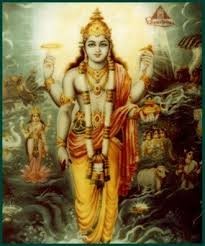DhanTeras: DhanTrayodashi: thirteenth day of the waning phase of the Moon in the month of Kartik. The day Dhanvantri emerged from the churning of the oceans bearing the pot of Amrit(nectar of immortality). DhanVantri is the God of Ayurveda. Dhan literally means Wealth. Hence, Lakshmi(Goddess of Wealth) and Kuber(Divine Treasurer) are also worshipped. Incidentally, Yama, the God of Death also gets a day of worship: today. How interesting that the deities of health and wealth as well as death are worshipped on the same day. Therefore, the western maxim of health is wealth is totally based as per Indian tradition. DhanTeras is also the official opener to the festive season of Diwali which is a harvest festival followed by the winter season of feasting throughout.
Today, 25th October will be celebrated as World Ayurveda Day. AyurVeda (Ayush=Lifespan + Veda=Knowledge): The art of living life; popularly called the sister science of Yoga. Both Yoga and Ayurveda use a holistic approach to the human entity based on a common philosophical foundation of Samkhya-the twin philosophy of yoga. Ayurveda applies a multi level method of diagnosis and treatment. It has a larger percentage of preventive than curative applications and has been structured as a solid eight branched(specialisations) system used over millenia and enriched by Sages and Vaidyas that have contributed to it through much experience. Sushrut(Surgery), Charaka and Vagabhatta are but a few eminent names.
Today, as World Ayurveda day has been declared, it is with the same good intent that international day of yoga was. The unfortunate denigration that has afflicted the yoga tradition has also begun to taint the Ayurveda tradition. In much the same manner that western based capitalist registration bodies have randomly littered yoga with teacher training certificates, Ayurveda practitioner certifications have also joined the charade. Ayurveda degree (Bachelor of Ayurveda Medical Science) studies are an intense study undertaken for a minimum of five long years, after which diagnosis and prescription capability are certified. In tradition, the study was passed through familial generations of Vaidyas. This tradition was shattered by the western medical system that the colonisers brought alongwith them. Now, the same colonising westerners have taken up the strewn shards that don't construe the (w)holistic picture and capitalise upon it as Ayurveda knowledge. These practitioners(?) are also certified with a few weeks to a month's study in which just about the basics of the doshas are covered.
This same laxitude reflects in every second social media marketing post on Ayurveda as remedies for Vata/Pitta/Kapha related disorders: as if on sale. The half baked yoga teachers that have depleted themselves from their shallow basket have now turned to cash in on the new coin word: Ayurveda. Flinging words like Vata and Pitta around seem substantially exotic enough to validate the incompetence on display. I clearly recall my mothers advice: 'Never do utVaidyu (topsy turvy Vaidya=quackery)'. These half baked utVaidyas/ so called Ayurveda practitioners will practice their half knowledge on unsuspecting patients to create further complication in the disease. I had the horror of recently experiencing this in person with a guy who shares yoga and Ayurveda lifestyle classes. He took an all women group shopping and all return brandishing bottles of shatavari capsules. Fine (despite the fact that aurveda is best administered as powders…too long to explain and not contextually required for this blog). Next day, as the ladies had prakriti parikshan(body type analysis) with an actual Ayurveda Vaidya, I discovered that one is a patient of Fibromyalgia and shatavari would be contraindicated. Noticed the guy had pretty much a similar irresponsible approach to yoga too. The needful earful for teaching with contraindications clearly spoken about to the wannabe guru became my onus. Was not this the job of his teachers who certified him for Yoga in the first place?
Yoga and Ayurveda are a great combination: if used judiciously and with due precautions. All good institutions of Yoga share a subject of Ayurveda basics for the advanced study of Yoga with good reason. If one is interested in Ayurveda and wishes to share it a supplement to yoga, by all means one should use and apply the knowledge at the basic level. As long as it relates to usage after full diagnosis by a Vaidya. To diagnose and administer medications without edu-caution is not only unethical, it means playing with someone's health for cashing in on a fad and creating ego gratification. One can also choose to undertake the entire ardous study before disseminating advice.
In the light of Health, and thus creating wealth, I wish all a very Happy and Prosperous festive Season of Diwali.


